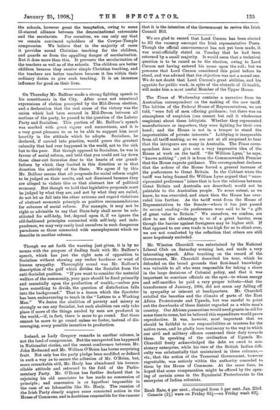On Thursday Mr. Balfour made a strong fighting speech to
his constituents in the City. After some not unnatural expressions of elation prompted by the Mid-Devon election, and a declaration that the real cause of the victory was the union which had been secured in Mid-Devon between all sections of the party, he passed to the question of the Labour Party and Socialism. This portion of Mr. Balfour's speech was marked with great vigour and earnestness, and it is a very great pleasure to us to be able to support him most heartily in the attitude which he adopts. Socialism, he declared, if carried into practice, would prove the greatest calamity that had ever happened in the world, not to the rich but to the poor. But though opposed to Socialism, he was in favour of social reform, and held that you could not lay down those clear-cut formulae dear to the hearts of our grand- fathers by which they limited in this direction or in that direction the activity of the State. We agree if by this Mr. Balfour means that all proposals for social reform ought to be judged on their merits, and not dismissed because they are alleged to violate this or that abstract law of political economy. But though we hold that legislative proposals must be judged by what they are, and not by what they are called, do not let us fall into the other extreme and regard violations of abstract economic principle as positive recommendations for schemes of social reform. For example, it may not be right or advisable to say that State-help shall never be sub- stituted for self-help, but, depend upon it, if we ignore the old-fashioned principles connected with self-help and inde- pendence, we may very easily land ourselves in such dangerous paradoxes as those connected with unemployment which we describe in another column.




















































 Previous page
Previous page